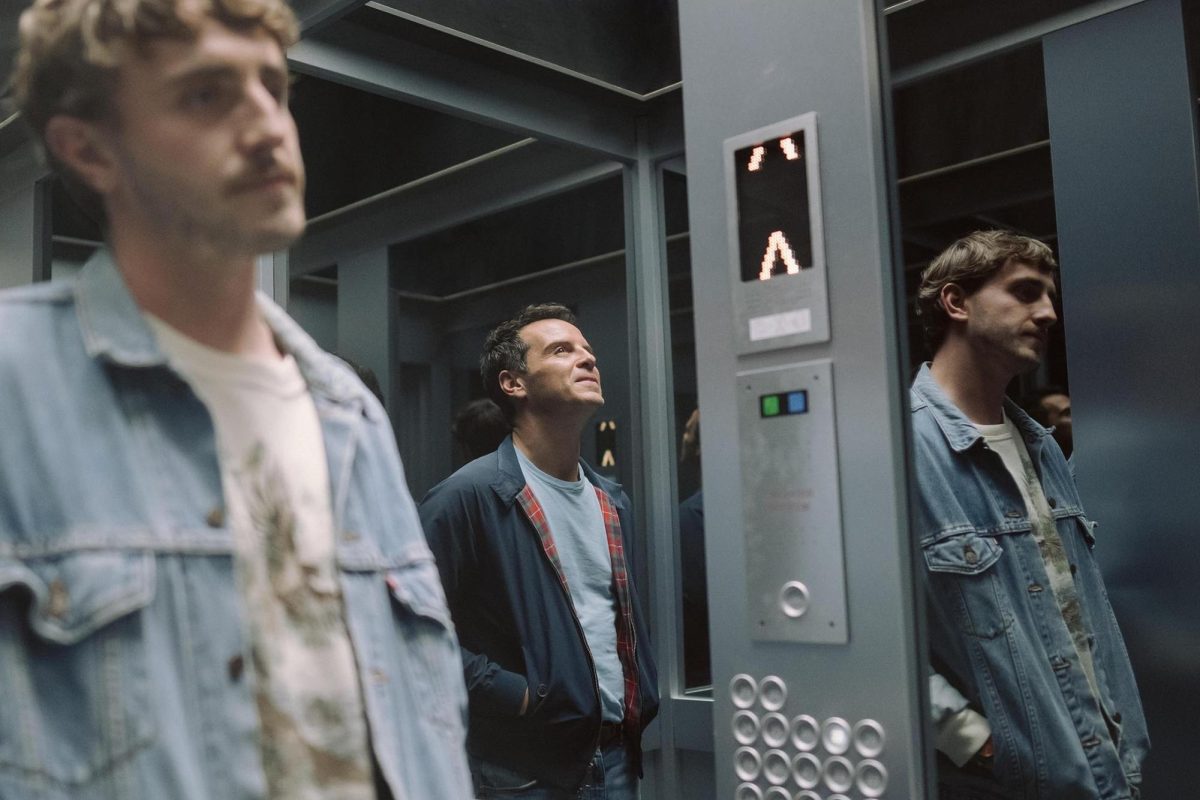Spoiler warning: This article includes spoilers for “All of Us Strangers.”
I am an avid believer that one of the best ways to watch a movie is to go in blind. Ideally, that means avoiding trailers. However, there are many cases where the trailers don’t actually reveal anything, and even if you’ve seen them, you feel as though you’re going in blind anyway.
For me, “All of Us Strangers” was one of those cases.
The trailers I couldn’t avoid led me to expect a romance — albeit a devastating one. But I was entirely unprepared for the type of emotional reckoning this movie planned on tackling.
Written and directed by English filmmaker Andrew Haigh, the film follows Adam (Andrew Scott), a screenwriter who enters a new relationship with his strange neighbor Harry (Paul Mescal). Toward the beginning of the film, Adam finds his parents (Claire Foy and Jamie Bell) mysteriously alive in his childhood home, despite them having died 30 years prior in a car accident. As Adam unpacks his longing for connection in childhood with his parents, and in adulthood with Harry, he navigates a liminal space that is both uncomfortable and healing.
A welcomed departure from his more charismatic and candid role as the hot priest on “Fleabag,” Scott perfectly captures the helplessness that accompanies grief in his portrayal of Adam. When reimagining childhood memories with his parents, like Christmas mornings or sleepless nights, he effectively balances naiveté and maturity, even providing an occasional laugh in an otherwise sorrowful story.
One of the most touching aspects of the movie’s healing journey through his youth is his coming out. Adam not only gets the closure of telling his parents he is gay, but also after he does, in a beautifully simple scene at an empty mall diner, he hears how proud his father is and how much his mother loves him just as he is.
In their often sentimental scenes together, Mescal and Scott compliment each other’s performances, bringing much-needed authenticity to their relationship. Their love is not only passionate, but also acts as a form of healing, providing solace for the both of them after years of loneliness and estrangement as LGBTQ+ individuals.
Similarly, Foy and Bell beautifully convey parental love as well as disappointment, be it in Adam or themselves. Despite the two actors portraying their characters as ghosts, their performances ground the piece. In an otherwise distressing movie, they help the supernatural aspect of their existence from feeling too uncanny and sincerely talk Adam through stitching up old wounds.
The cherry on top of these performances was, unsurprisingly, the cinematography. Gloomy, eerie and intimate, it created a sensation of sadness, loneliness and, most importantly, nostalgia — all of which was ideal for Adam’s emotional journey through childhood trauma.
The score furthered this unsettling feeling with dark, ethereal yet somewhat robotic compositions. Delicate ringing echoes and fades into deep humming with waves of uneasy electronic currents, channeling the overwhelming emptiness that characterizes Adam’s childhood. This blends perfectly with the synth-pop songs like “Always on My Mind” by Pet Shop Boys that are laced into emotional scenes, creating a sense of haunting.
While I don’t mind a heartbreaking movie, the twist ending unfortunately took this film from sad to downright depressing, with very little payoff. Harry having been dead since the night Adam first met him, with him and the seemingly resurrected parents all being figments of Adam’s imagination, is not only an uncreative take on the “everything was a dream” trope, but also another door opening when we most need closure.
If Harry dies the first night they meet, it logistically negates their entire romance. We are expected to believe that, after consoling an imaginary Harry through his death, Adam has healed from his trauma and overcome his numbness. This is a beautiful thought, but the death of Harry — Adam’s chosen family — just seems like yet another traumatizing experience. Leaving the theater, I felt pointlessly depressed rather than hopeful or at the very least soothed.
Had it not been for the poignant performances and visual presentation, I would willfully forget ever seeing “All of Us Strangers.” Despite presenting a character-driven narrative, the movie does not actually give the characters much depth outside of their relationships. Thankfully, watching these relationships and the dynamics between the actors on-screen was moving enough to make me invested.
Ultimately, it would be more appropriate to say I experienced this film rather than enjoyed it. For a film oozing with so much authentic and raw emotion, “All of Us Strangers” ends with a plot twist requiring such a drastic suspension of reality that it undermines the intensity of the story as a whole. Though I would have preferred Harry be alive in the end to affirm Adam’s newfound vulnerability, Haigh’s picture is still worth a watch.
It may have been snubbed of any Oscar nominations but “All of Us Strangers” is nevertheless a triumph for LGBTQ+ cinema and the talented actors who brought these wistful relationships to life.
Contact Juliana Guarracino at [email protected].


























































































































































